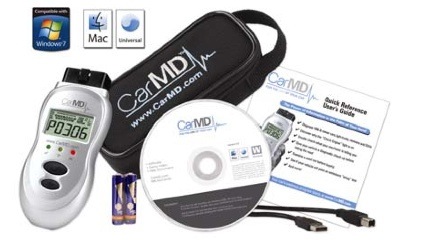There are lots of health care products available for the Mac. But there’s also an automotive “health care” system: CarMD’s (http://www.carmd.com) CarMD Handheld Tester and Software System for Macs and Personal Computers.
CarMD.com Corp., which debuted the dual-platform Mac/Windows version of its award-winning consumer automotive diagnostic tool in October 2010, demonstrated the latest (and Snow Leopard compatible) version of its product and web site as a first-time exhibitor at MacWorld 2010 in February.
“CarMD is committed to offering drivers the latest in vehicle and computer coverage, which is why our software engineers and programmers made it a priority to develop an updated version as soon as Snow Leopard was available,” says Richard Amador, director of marketing for CarMD.com Corp. “We look forward to introducing our solutions-based product to the growing Apple Mac community, which includes many of our current customers and our employees who have made the switch to Mac as their primary desktop and notebook platforms.”
Every CarMD 2100 Handheld Device & Software System sold after Oct. 17 features CarMD’s Runtime Software 3.0.3, which is compatible with Mac OS X 10.4.4 and higher (for both Power Personal Computer and Intel-based Macs). Customers who recently upgraded or purchased a Mac with Snow Leopard are encouraged to download the new CarMD Runtime Version 3.0.4.
The CarMD handheld device — which fits into a purse or glove compartment — and software system works on all 1996 and newer OBD2 cars, light trucks, SUVs and minivans manufactured for use in the U.S. — foreign and domestic. The tester can be used by the average driver to quick check an unlimited number of vehicles. The handheld device links to a vehicle’s computer through a port found under the dashboard.
Within seconds, its Vehicle Health Monitor LEDs (green, yellow, red) tell the driver if the vehicle’s systems are running normally. When a problem is found, CarMD customers gain access to a diagnostic database using the included software, their computer and own Internet connection, to generate a report with probable cause, estimated repair costs, vehicle recalls and more. CarMD also offers a printable/email-able report that includes probable cause, most likely fix and estimated do-it-yourself and do-it-for-me repair costs, with parts and labor by region.
You can use CarMD to perform such tasks as:
° Find out why your “Check Engine” light is on;
° Diagnose problems and determine estimated repair costs so you can compare notes with your mechanic;
° Check out a used car before buying or selling;
° Identify problems before taking a road trip;
° Find out if your vehicle will pass an emissions “smog” check.
Not a mechanic? Don’t like to get greasy? No problem. You don’t have to pop the hood or risk getting greasy to use CarMD. It can be used from the safety and comfort of your vehicle’s front seat. There are nine different locations inside the car where the OBD Data Link Connector can be found. The most popular location is just under the steering wheel.
To find your vehicle’s connector, go here: http://www.carmd.com/70.3/Article/Find_My_Car’s_Connector .
Provide your vehicle’s year, make and model. Note that this above search function may not include all 2009, 2010, and newer model years. This doesn’t mean that CarMD won’t work on these vehicles. It was designed to work on vehicles with an OBD II system , and all vehicles sold in the US that were manufactured since 1996 to today are required by law to have this system.
You can even use the handheld tester by itself and without the software. However, you’ll almost certainly want to use it with the software and CarMD web link, as it’s the web site that provides data such as trouble code definitions, probable causes, probable fixes, estimated repair costs and more.
— Dennis Sellers


![[MD1] PR: ATM Developers Progr](https://www.mactech.com/wp-content/themes/Extra/images/post-format-thumb-text.svg)
